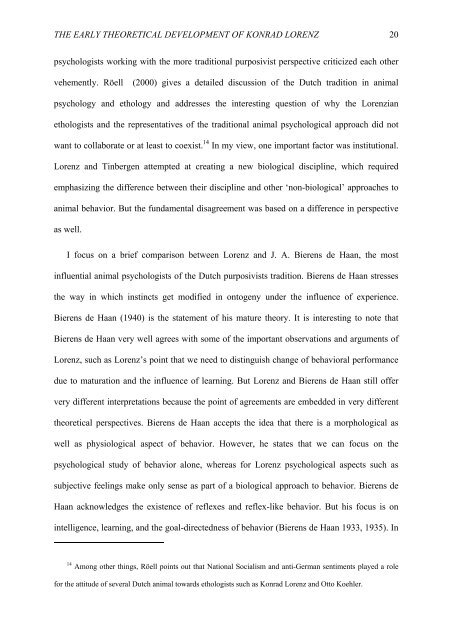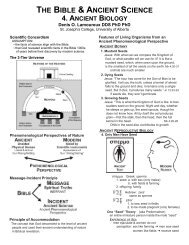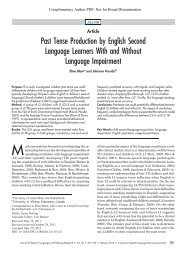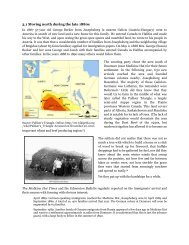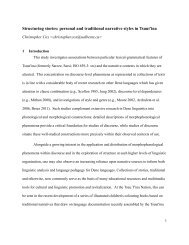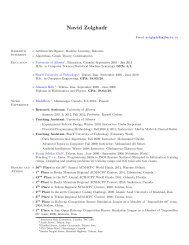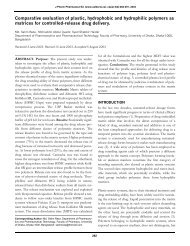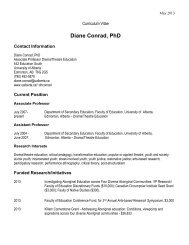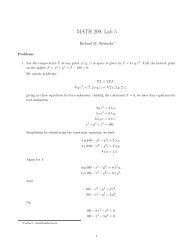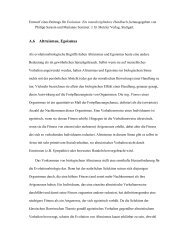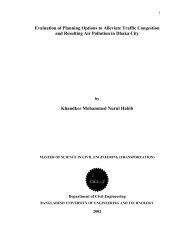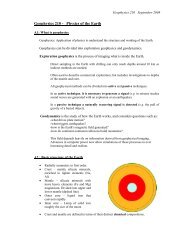The early theoretical development of Konrad Lorenz - University of ...
The early theoretical development of Konrad Lorenz - University of ...
The early theoretical development of Konrad Lorenz - University of ...
You also want an ePaper? Increase the reach of your titles
YUMPU automatically turns print PDFs into web optimized ePapers that Google loves.
THE EARLY THEORETICAL DEVELOPMENT OF KONRAD LORENZ 20<br />
psychologists working with the more traditional purposivist perspective criticized each other<br />
vehemently. Röell (2000) gives a detailed discussion <strong>of</strong> the Dutch tradition in animal<br />
psychology and ethology and addresses the interesting question <strong>of</strong> why the <strong>Lorenz</strong>ian<br />
ethologists and the representatives <strong>of</strong> the traditional animal psychological approach did not<br />
want to collaborate or at least to coexist. 14 In my view, one important factor was institutional.<br />
<strong>Lorenz</strong> and Tinbergen attempted at creating a new biological discipline, which required<br />
emphasizing the difference between their discipline and other ‘non-biological’ approaches to<br />
animal behavior. But the fundamental disagreement was based on a difference in perspective<br />
as well.<br />
I focus on a brief comparison between <strong>Lorenz</strong> and J. A. Bierens de Haan, the most<br />
influential animal psychologists <strong>of</strong> the Dutch purposivists tradition. Bierens de Haan stresses<br />
the way in which instincts get modified in ontogeny under the influence <strong>of</strong> experience.<br />
Bierens de Haan (1940) is the statement <strong>of</strong> his mature theory. It is interesting to note that<br />
Bierens de Haan very well agrees with some <strong>of</strong> the important observations and arguments <strong>of</strong><br />
<strong>Lorenz</strong>, such as <strong>Lorenz</strong>’s point that we need to distinguish change <strong>of</strong> behavioral performance<br />
due to maturation and the influence <strong>of</strong> learning. But <strong>Lorenz</strong> and Bierens de Haan still <strong>of</strong>fer<br />
very different interpretations because the point <strong>of</strong> agreements are embedded in very different<br />
<strong>theoretical</strong> perspectives. Bierens de Haan accepts the idea that there is a morphological as<br />
well as physiological aspect <strong>of</strong> behavior. However, he states that we can focus on the<br />
psychological study <strong>of</strong> behavior alone, whereas for <strong>Lorenz</strong> psychological aspects such as<br />
subjective feelings make only sense as part <strong>of</strong> a biological approach to behavior. Bierens de<br />
Haan acknowledges the existence <strong>of</strong> reflexes and reflex-like behavior. But his focus is on<br />
intelligence, learning, and the goal-directedness <strong>of</strong> behavior (Bierens de Haan 1933, 1935). In<br />
14 Among other things, Röell points out that National Socialism and anti-German sentiments played a role<br />
for the attitude <strong>of</strong> several Dutch animal towards ethologists such as <strong>Konrad</strong> <strong>Lorenz</strong> and Otto Koehler.


